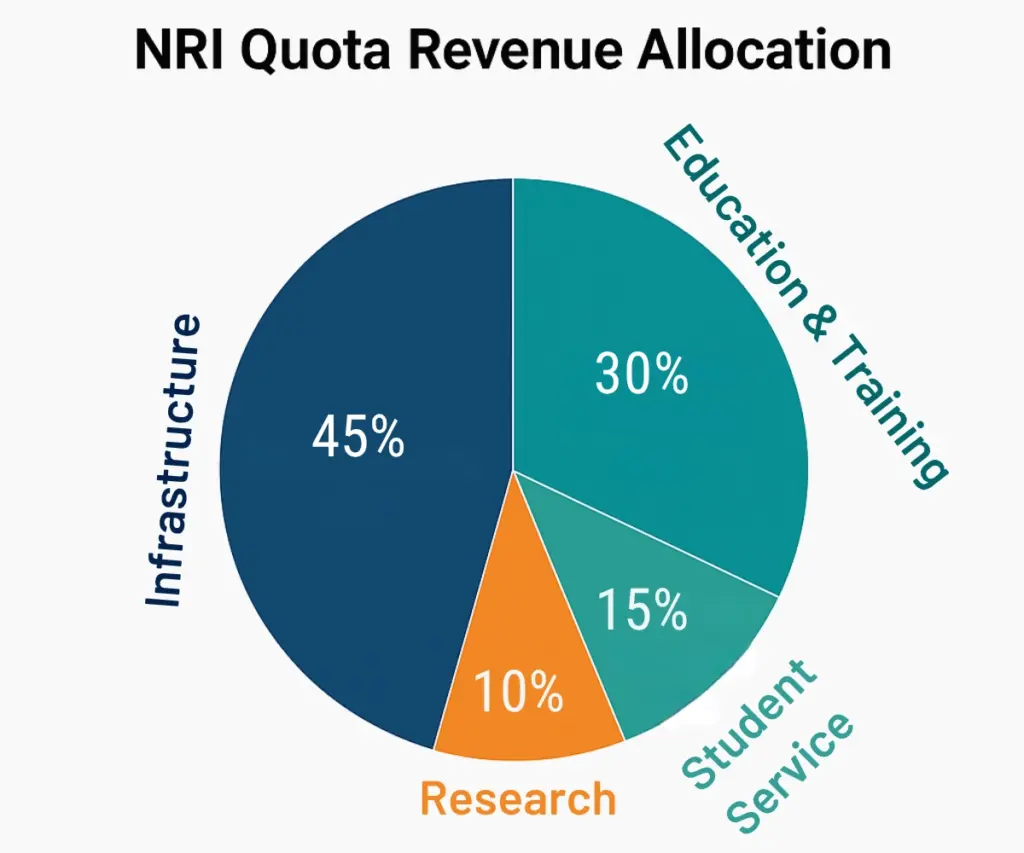In recent years, there is a remarkable shift being observed in medical education trends among Non-Resident Indians (NRIs). Traditionally, many NRI students preferred pursuing MBBS abroad, in countries of their residence are near by, often due to limited seats in India and the perception of easier admissions overseas.
nri-return-india-mbbs-nri-quotas
However, a growing number of NRIs are now opting to study MBBS within India, a trend encouraged by the National Medical Commission (NMC) and supported by central and state governments through the introduction of NRI quota seats in top medical colleges.
This development has created a win-win scenario, students get access to quality Indian medical education in their motherland, while colleges benefit financially, using these funds to enhance infrastructure, expand capacity, and improve overall educational quality.
This article explores why NRIs are returning to India for MBBS, how NRI quota seats work, the role of government policies, and the broader impact on medical education in India.
Why NRIs Are Returning to India for MBBS
High-Quality Medical Education in India: Meeting Global Standards
India’s medical education system is rapidly evolving to match global standards, with reforms introduced by the National Medical Commission (NMC) and modern infrastructure in top colleges. NRIs now have access to world-class education comparable to the UK and US.
Key Quality Features:
- Global Benchmarks: Integrated curriculum with theory and clinical practice, early patient exposure, evidence-based learning.
- Competency-Based Medical Education (CBME): Focus on communication, ethics, professionalism, research opportunities, and continuous assessments.
- Infrastructure & Faculty: Simulation labs, advanced research labs, digital libraries, and experienced faculty trained in global medical systems.
- Research & Innovation: Participation in biomedical research, clinical trials, and publications in indexed journals.
- Recognised Degrees: NMC-approved MBBS degrees are accepted worldwide, enabling practice in India and opportunities abroad.
Top Indian Medical Colleges for NRIs:
Recognised Degrees and Career Opportunities
Indian MBBS degrees are recognised globally, provided they are obtained from NMC-approved colleges. This ensures that NRIs:
- Can practice medicine in India.
- Have opportunities to pursue postgraduate specialisation in India or abroad.
- Enjoy international recognition, which is beneficial for global career options.
In contrast, foreign MBBS programs may require additional licensing exams or may face recognition issues in certain countries.
Cultural Familiarity and Family Convenience
Studying in India provides NRIs with a comfortable, familiar environment, reducing the challenges often associated with moving abroad:
- Ease of communication: English-medium instruction and regional languages.
- Family proximity: Emotional support and reduced homesickness.
- Cultural comfort: Food, festivals, and local lifestyle are familiar.
These factors contribute significantly to students’ mental well-being, academic focus, and overall learning experience.
Streamlined Processes and NMC Policies
The NMC and Indian governments have simplified admission and documentation processes for NRIs:
- NRI quota seats are now available in private, deemed, and select government colleges.
- Required documentation, including a passport, visa, NRI proof, and NEET qualification, is now processed efficiently through centralised portals or state-specific counselling systems.
- Eligibility criteria ensure that only NEET-qualified candidates can secure admissions, maintaining academic standards.
Read Also: How to Use NRI Quota in MCC NEET UG 2025 Counselling?
How NRI Quota Seats Work: A Win-Win Situation
Benefits for Students
Reserved seats under the NRI quota provide NRIs with:
- Guaranteed access to some of India’s top medical colleges, including deemed universities and even AIIMS, with NRI provisions.
- NRI Quota Cutoff is also remains very low which makes it simpler and less competitive admission pathway, especially compared to general quota seats that have high NEET cutoffs.
- Opportunity to study in India while staying close to family, avoiding the challenges of foreign medical education.
Benefits for Colleges
NRI quota seats also provide significant advantages to institutions:
- High tuition revenue: Colleges often charge MBBS NRI Quota fees very higher than general quota seats, generating funds that can be reinvested in the institution.
- Infrastructure development: Colleges utilise this revenue to construct new labs, upgrade teaching hospitals, enhance library resources, and improve hostel facilities.
- Capacity expansion: Increased funds allow colleges to increase the number of general quota seats over time, indirectly benefiting domestic students.
- Cross-subsidisation: Revenue from NRI students often helps subsidise education costs for Indian students, maintaining affordability for local aspirants.
A private deemed medical university may charge ₹40-50 lakh for an NRI quota seat, compared to ₹8-15 lakh for a general quota seat.
These funds are used to upgrade hospital infrastructure, purchase high-end lab equipment, and improve faculty salaries, ultimately improving education quality for all students.
NRI Quota MBBS Seats in India: State-Wise Overview
Several Indian states offer NRI quota seats in medical colleges, both in government and private institutions, allowing Non-Resident Indians to pursue MBBS in India under reserved seats.
States with NRI Quota in Government Medical Colleges
The following states have designated NRI quota seats in their government medical colleges:
| State | NRI seats are available at comparatively lower annual fees. |
|---|---|
| Rajasthan | Largest contributor, offering a significant number of NRI seats. |
| Gujarat | Offers a specific number of NRI seats in government colleges. |
| Karnataka | Newly added 51 NRI seats across its government medical colleges. |
| Andhra Pradesh | Provides a substantial number of NRI quota seats. |
| Himachal Pradesh | NRI seats available at comparatively lower annual fees. |
| Goa | Limited number of NRI quota seats. |
| Punjab | Offers NRI quota in government medical colleges. |
States with NRI Quota Only in Private Medical Colleges
Some states reserve NRI seats exclusively in private or self-financed medical colleges:
- West Bengal
- Madhya Pradesh
- Kerala
- Karnataka
- Telangana
- Andhra Pradesh
- Tamil Nadu
These states do not have NRI seats in government colleges but allow admissions in private institutions under the NRI quota.
Deemed Universities
All deemed medical universities across India maintain a roughly 15% reservation quota for NRI students. This applies uniformly regardless of the state, making deemed universities a popular option for NRI aspirants.
Read Also: NEET UG NRI Quota 2025: Dates, Eligibility, Cut off, Documents etc
How Colleges Benefit from NRI Fees
The introduction of NRI quotas has transformed the financial landscape of Indian medical colleges:
- Revenue generation: High NRI tuition provides colleges with funds to enhance infrastructure.
- Research and development: Some colleges use NRI funds to improve research labs and clinical trials, contributing to medical innovation.
- Faculty development: Increased budgets allow colleges to hire more experienced professors and doctors, improving teaching quality.
- Student amenities: Hostels, libraries, sports facilities, and cafeterias are upgraded for all students.
This model demonstrates a win-win: NRI students gain access to top-quality education, and colleges improve infrastructure and teaching standards.

Simplified Admission Process for NRIs
The Indian government and NMC have streamlined the admission process to make it easier for NRIs:
- Centralised application portals for NRI seats in multiple states.
- E-counselling sessions to guide NRI students through documentation and fee payment.
- Clear eligibility rules: NEET qualification and NRI status proof.
- Reduced paperwork compared to earlier years, when manual verification was cumbersome.
These measures encourage more NRIs to consider India as a viable destination for medical education.
Challenges and Considerations
Despite the advantages, some challenges remain:
- Balancing merit vs quota: Maintaining fairness for domestic students while honouring NRI seats.
- Transparency in fee structure: Ensuring NRI fees are regulated and justified.
- Quality control: Colleges must ensure NRI revenue improves education quality, not just finances.
- Awareness: Many NRIs are still unaware of NRI quota policies and simplified admission procedures.
Addressing these challenges is key to making the system sustainable and equitable.
Future Outlook
The trend of NRIs returning to India for MBBS is expected to accelerate due to:
- Increase in NRI quota seats in top private and deemed universities.
- Policy support for easier admissions and reduced bureaucracy.
- Enhanced infrastructure funded by NRI tuition, benefiting all students.
- Global recognition of Indian medical degrees.
This model strengthens medical education in India while providing NRIs a seamless path to pursue their medical careers without leaving the country.
Read Also: NEET UG 2025 Scam: ED Finds Fake NRI Quota Admissions
NRI Quota Seats and Fees in NEET 2025
The following table shows some of India’s leading medical colleges that offer MBBS admissions under the NRI quota, along with their states, MBBS NRI quota fees and seats reserved:
| Name of the College | State | MBBS NRI Quota Fees | Number of NRI Quota Seats |
| Vinayak Mission Medical College & Hospital Karaikal | Puducherry | INR 31.000 | 41 |
| Sree Sidharth Medical College (SSMC Tumkur) | Karnataka | $ 50,000 | 19 |
| Maharishi Markendeshwar Institute of Medical Science & Research, Mullana | Haryana | $ 1,60,000 (for the entire course) | 22 |
| Datta Meghe Medical College Nagpur (DNIMS), Wardha | Maharashtra | $ 27,500 | 30 |
| Yenepoya Medical College, Malanpur | Karnataka | $ 64,000 | 23 |
| Jawaharlal Nehru Medical College, Belgaum | Karnataka | $ 45,500 | 30 |
| BVDU Medical College & Hospital, Sangli | Maharashtra | $ 85,050 | 23 |
| Amrita School of Medicine, Kota | Kerala | $ 50,000 | 15 |
| Bharti Vidyapeeth Deemed University Medical College, Pune | Maharashtra | $ 85,050 | 23 |
| Dr DY Patil Medical College, Hospital & Research Centre (DYPMC), Pune | Maharashtra | $ 60,000 | 38 |
Note: The NRI quota fees and the number of seats are subject to change.
The return of NRIs to India for MBBS is a win-win for students and colleges alike. Students enjoy quality education, familiar cultural settings, and recognised degrees, while colleges benefit from high tuition revenue used for infrastructure, research, and capacity expansion.
Government policies, simplified documentation, and NMC-approved programs have made India a preferred destination for NRI medical aspirants.
By strategically leveraging NRI quota seats, India is creating a sustainable model that improves medical education standards, enhances infrastructure, and ensures that both domestic and NRI students reap the benefits of a world-class MBBS education at home.

